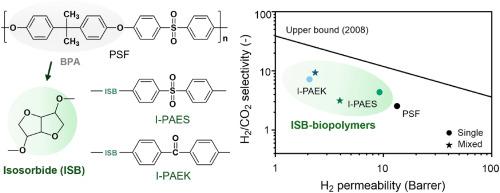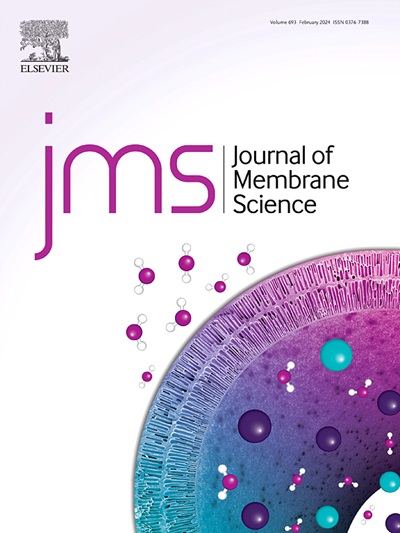Isosorbide-based Poly(arylene ether) biopolymer membranes for gas separation
Abstract
Efforts to utilize biopolymer membranes to diminish the carbon footprint of separation processes are ongoing. Herein, we report the fabrication of isosorbide (ISB)-based poly(arylene ether) biopolymer membranes, including ISB-based poly(arylene ether sulfone) (I-PAES) and ISB-based poly(arylene ether ketone) (I-PAEK) for gas separation. The robust mechanical properties and amorphous nature of ISB-based biopolymers allow for their application to gas separations. Both positron annihilation lifetime spectroscopy (PALS) and free volume analysis using density measurements reveal that replacing bisphenol A (BPA) in polysulfone (PSF) with ISB results in a significant reduction in free volume owing to the absence of bulky dimethyl groups and the presence of polar aliphatic ether groups. Substituting the sulfone group for a ketone group further decreased free volume. Solid-state CP/MAS 13C NMR analysis discloses that substituting ISB and replacing sulfonyl moieties with carbonyl groups restricts the rotational motion of internal rings, resulting in inhibited gas diffusion. Consequently, the I-PAEK membrane exhibited H2/CO2 and H2/CH4 selectivities more than three times and five times higher, respectively, compared to the PSF counterpart. Our present study demonstrates the feasibility of ISB-based poly(arylene ether) biopolymer membranes for gas separation.


| 公司名称 | 产品信息 | 采购帮参考价格 |
|---|
 求助内容:
求助内容: 应助结果提醒方式:
应助结果提醒方式:


